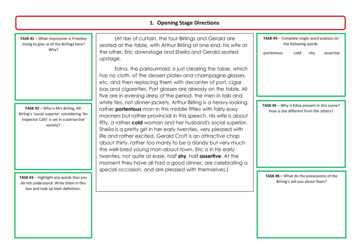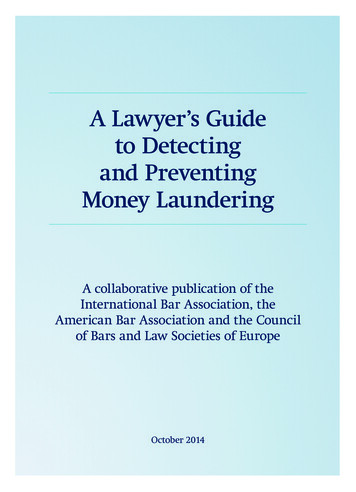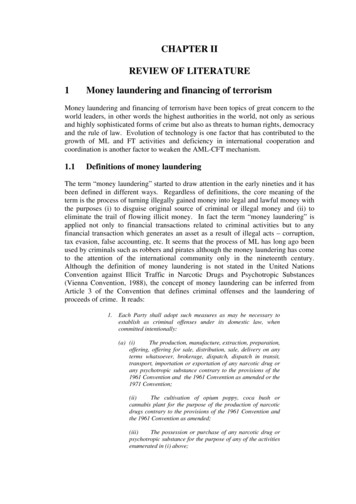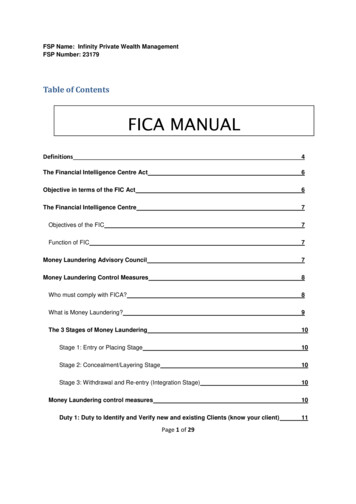
Transcription
1. Opening Stage DirectionsTASK #1 – What impression is Priestleytrying to give us of the Birlings here?Why?TASK #2 – Why is Mrs Birling, MrBirling’s ‘social superior’ considering ‘AnInspector Calls’ is set in a patriarchalsociety?TASK #3 – Highlight any words that youdo not understand. Write them in thisbox and look up their definition.#(At rise of curtain, the four Birlings and Gerald areseated at the table, with Arthur Birling at one end, his wife atthe other, Eric downstage and Sheila and Gerald seatedupstage.Edna, the parlourmaid, is just clearing the table, whichhas no cloth, of the dessert plates and champagne glasses,etc, and then replacing them with decanter of port, cigarbox and cigarettes. Port glasses are already on the table. Allfive are in evening dress of the period, the men in tails andwhite ties, not dinner-jackets. Arthur Birling is a heavy-looking,rather portentous man in this middle fifties with fairly easymanners but rather provincial in this speech. His wife is aboutfifty, a rather cold woman and her husband's social superior.Sheila is a pretty girl in her early twenties, very pleased withlife and rather excited. Gerald Croft is an attractive chapabout thirty, rather too manly to be a dandy but very muchthe well-bred young man-about-town. Eric is in his earlytwenties, not quite at ease, half shy, half assertive. At themoment they have all had a good dinner, are celebrating aspecial occasion, and are pleased with themselves.)TASK #4 – Complete single word analysis onthe following words:-portentous-cold-shy-assertiveTASK #5 – Why is Edna present in this scene?How is she different from the others?TASK #6 – What do the possessions of theBirling’s tell you about them?
2. ‘Lower costs and higher prices ’TASK #1 – Why do you really think SirGeorge and Lady Croft are not at theparty?Mrs Birling: Now stop it, you two. Arthur, what about this famoustoast of yours?TASK #4 – What kind of character is Eric here?Birling: Yes, of course. (clears his throat.) Well, Gerald, I know youagreed that we should only have this quiet little family party. It's apity Sir George and – er – Lady Croft can't be with us, but they'reabroad and so it can't be helped. As I told you, they sent me avery nice cable – couldn't be nicer. I'm not sorry that we'recelebrating quietly like thisMrs Birling: Much nicer really.Gerald: I agree.TASK #2 – Highlight everywhere whereMr Birling mentions Sheila in hisengagement speech. What do younotice? What does this tell you?TASK #3 – Does Mr Birling actually careabout Sheila’s engagement? Discussyour ideas using quotations from thetext.Birling: So do I, but it makes speech-making more difficultEric: (not too rudely) Well, don't do any. We'll drink their health andhave done with it.Birling: No, we won't. It's one of the happiest nights of my life. Andone day, I hope, Eric, when you've a daughter of your own, you'llunderstand why. Gerald, I’m going to tell you frankly, without anypretences, that your engagement to Sheila means a tremendouslot to me. She'll make you happy, and I’m sure you'll make herhappy. You're just the kind of son-in-law I always wanted. Yourfather and I have been friendly rivals in business for some time now– though Crofts Limited are both older and bigger than Birling andcompany – and now you've brought us together, and perhaps wemay look forward to the time when Crofts and Birlings are nolonger competing but are working together – for lower costs andhigher prices.Gerald: Hear, hear! And I think my father would agree to that.#TASK #5 – How does this extract enforce MrBirling as a capitalist?TASK #6 – ‘You’re just the son-in-law I alwayswanted’ – Which of Gerald’s qualities does MrBirling like?
3. ‘The Ring’TASK #1 – ‘Look mummy ’ – What doesthis quotation tell you about Sheila’scharacter?Sheila: (trying to be light and easy) You be careful – or I’ll startweeping.TASK #4 – What kind of character is Eric here?Gerald: (smiling) Well, perhaps this will help to stop it. (He producesa ring case.)Sheila: (excited) Oh – Gerald – you’ve got it – is it the one youwanted me to have?Gerald: (giving the case to her) Yes – the very one.Sheila: (taking out the ring) Oh – it's wonderful! Look – mummy –isn't it a beauty? Oh – darling -TASK #2 – What do you think the ringsymbolises here?(She kisses Gerald hastily.)Eric: steady the buffs!TASK #5 – Consider the stage directions thathave been highlighted. What do they tell youabout the atmosphere of this scene? Why doesPriestley want to set this atmosphere?Sheila: (who has put the ring on, admiringly) I think it's perfect. NowI really feel engaged.Mrs Birling: So you ought, darling. It's a lovely ring. Be careful with it.Sheila: Careful! I'll never let it go out of my sight for an instant.TASK #3 – ‘I’ll never let it go out of mysight for an instant’ – Considering whathappens later in the play, what is thesignificance of this line?Mrs Birling: (smiling) Well, it came just at the right moment. Thatwas clever of you, Gerald. Now, Arthur, if you've no more to say, Ithink Sheila and I had better go into the drawing room and leaveyou menBirling: (rather heavily) I just want to say this. (noticing that Sheila isstill admiring her ring.) Are you listening, Sheila? This concerns youtoo. And after all I don't often make speeches at you Sheila: I’m sorry, daddy. Actually I was listening.#(She looks attentive, as they all do. He holds them for a momentbefore continuing.)TASK #6 – ‘(He holds them for a momentbefore continuing)’ – Why does Mr Birling dothis?
4. Birling’s Speech #1TASK #1 – Highlight everything inBirling’s speech that he gets wrong.How is DRAMATIC IRONY being usedhere?TASK #2 – What is Priestley hopingto achieve by making Birlingunlikeable?TASK #3 – Eric tries to speak to hisfather in this speech but Birlingkeeps cutting him off. Why do youthink Birling treats Eric in this way?#I just want to say this. There’s a good deal of silly talk about these days – but –and I speak as a hard-headed business man, who has to take risks and knowswhat he’s about – I say, you can ignore all this silly pessimistic talk. When youmarry, you’ll be marrying at a very good time. Yes, a very good time – and soonit’ll be an even better time. Last month, just because the miners came out onstrike, there’s a lot of wild talk about possible labour trouble in the near future.Don’t worry. We’ve passed the worst of it. We employers at last are comingtogether to see that our interests – and the interests of Capital – are properlyprotected. And we’re in for a time of steadily increasing prosperity.Just because the Kaiser makes a speech or two, or a few German officers havetoo much to drink and begin talking nonsense, you'll hear some people say thatwar's inevitable. And to that I say - fiddlesticks! The Germans don't want war.Nobody wants war, except some half-civilized folks in the Balkans. And why?There's too much at stake these days. Everything to lose and nothing to gain bywar.I say there isn't a chance of war. The world's developing so fast that it'll makewar impossible. Look at the progress we're making. In a year or two we'll haveaeroplanes that will be able to go anywhere. And look at the way the automobile's making headway - bigger and faster all the time. And then ships. Why,a friend of mine went over this new liner last week - the Titanic - she sails nextweek - forty-six thousand eight hundred tons - New York in five days - andevery luxury - and unsinkable, absolutely unsinkable. That's what you've got tokeep your eye on, facts like that, progress like that - and not a few Germanofficers talking nonsense and a few scaremongers here making a fuss aboutnothing.Now you three young people, just listen to this - and remember what I'm tellingyou now. In twenty or thirty years’ time - let's say, in 1940 - you may be giving alittle party like this - your son or daughter might be getting engaged - and I tellyou, by that time you'll be living in a world that'll have forgotten all theseCapital versus Labour agitations and all these silly little war scares. There'll bepeace and prosperity and rapid progress everywhere - except of course inRussia, which will always be behindhand naturally.TASK #4 - Why is Birling wrong here?‘We’re in for a time of steadily increasingprosperity.’TASK #5 – Why is Birling wrong when hespeaks to Eric and Gerald?‘When you marry, you’ll be marrying at avery good time.’TASK #6 – Birling presents his opinion asfact. Why does he do this? What does thistell you about his character?
5. Birling’s Speech #2TASK #1 – Highlight all of the personalpronouns. Does the fact they are allmasculine tell you anything aboutBirling or the time the play is set?TASK #2 – Look at the word ‘again’in the first line. What does it implyabout Birling?I don’t want to lecture you two young fellows again. Butwhat so many of you don’t seem to understand now,when things are so much easier, is that a man has tomake his own way – has to look after himself – and hisfamily too – and so long as he does that, he won’t cometo much harm. But the way some of these cranks talkand write now, you’d think everybody has to look aftereverybody else, as if we were all mixed up together likebees in a hive – community and all that nonsense. Buttake my word for it, you youngsters – and I’ve learnt inthe good hard school of experience – that a man has tomind his own business and look after himself and hisown – and—TASK #4 - Why does Birling emphasise thefact that Gerald and Eric are ‘young’?TASK #5 – How does Birling disregard thesocialist ideology in this extract? Try anduse a quotation in your answer.We hear the sharp ring of a front door bell. BIRLINGstops to listen.TASK #3 – Who is Birling referring towhen he says, ‘the way some ofthese cranks talk ’?#TASK #6 – Why does the doorbell ringwhen it does?
6. The InspectorTASK #1 – Complete single wordanalysis on the words highlighted in thestage directions. What can you inferabout the Inspector based on them?Edna: (opening door, and announcing) Inspector Goole.(The Inspector enters, and Edna goes, closing door after her. TheInspector need not be a big man but he creates at once animpression of massiveness, solidity and purposefulness. He is a manin his fifties, dressed in a plain darkish suit of the period. He speakscarefully, weightily, and has a disconcerting habit of looking hardat the person he addresses before actually speaking.)TASK #4 – How do you think Priestley wantsthe audience to react to the Inspector whenthey first see him enter?Inspector: Mr Birling?Birling: Yes. Sit down inspector.TASK #2 – ‘He speaks carefully,weightily ’ – What do these adverbssuggest about the Inspector?Inspector: (sitting) Thank you, sir.Birling: Have a glass of port – or a little whisky?TASK #5 – The Inspector’s lines are short andblunt compared to how Mr Birling speaks.Why?Inspector: No, thank you, Mr Birling. I'm on duty.Birling: You're new, aren't you?Inspector: Yes, sir. Only recently transferred.TASK #3 – Why do you think theInspector looks ‘hard’ at the person headdresses before speaking?#Birling: I thought you must be. I was an alderman for years – andlord mayor two years ago – and I’m still on the bench – so I knowthe Brumley police offices pretty well – and I thought I’d neverseen you before.Inspector: Quite so.TASK #6 – Why does Mr Birling mention hissocietal positions to the Inspector?
7. Sheila and MilwardsTASK #1 – How does the Inspectordemonstrate that he is in control here?Sheila: (distressed) I went to the manager at Milwards and I told him that if they didn't getrid of that girl, I’d never go near the place again and I’d persuade mother to close ouraccount with them.TASK #4 – Highlight everywhere in the extractwhere Sheila begins to accept responsibility.Inspector: And why did you do that?Sheila: Because I was in a furious temper.Inspector: And what had this girl done to make you lose your temper?Sheila: When I was looking at myself in the mirror I caught sight of her smiling at theassistant, and I was furious with her. I'd been in a bad temper anyhow.Inspector: And was it the girl’s fault?TASK #2 – How does Priestley createsympathy for Eva Smith through Sheila’sdescription of her?Sheila: No, not really. It was my own fault. (suddenly, to Gerald) All right, Gerald, youneedn't look at me like that. At least, I'm trying to tell the truth. I expect you've done thingsyou're ashamed of too.Gerald: (surprised) Well, I never said I hadn't. I don't see why –Inspector: (cutting in) Never mind about that. You can settle that between you afterwards.(to Sheila.) What happened?TASK #3 – How is Priestley beginning toportray the younger generation in apositive light?Sheila: I'd gone in to try something on. It was an idea of my own – mother had beenagainst it, and so had the assistant – but I insisted. As soon as I tried it on, I knew they'dbeen right. It just didn't suit me at all. I looked silly in the thing. Well, this girl had broughtthe dress up from the workroom, and when the assistant – Miss Francis – had asked hersomething about it, this girl, to show us what she meant, had held the dress up, as if shewas wearing it. And it just suited her. She was the right type for it, just as I was the wrongtype. She was very pretty too – with big dark eyes – and that didn't make it any better.Well, when I tried the thing on and looked at myself and knew that it was all wrong, Icaught sight of this girl smiling at Miss Francis – as if to say: 'doesn't she look awful' –and I was absolutely furious. I was very rude to both of them, and then I went to themanager and told him that this girl had been very impertinent – and – and – (she almostbreaks down, but just controls herself.) How could I know what would happen afterwards?If she'd been some miserable plain little creature, I don't suppose I’d have done it. Butshe was very pretty and looked as if she could take care of herself. I couldn't be sorry forher.Inspector: In fact, in a kind of way, you might be said to have been jealous of her.Sheila: Yes, I suppose so.#Inspector: And so you used the power you had, as a daughter of a good customer andalso of a man well known in the town, to punish the girl just because she made you feellike that?TASK #5 – Sheila agrees with what theInspector tells her and begins to accept thatwhat she has done is wrong. What does thistell you about her?TASK #6 – How have the rich and powerfulexploited the poor and weak in this scene?
8. Sheila questions GeraldTASK #1 – Summarise what ishappening in this scene.Sheila: He went into the drawing room, to tell mother what was happening here. Eric, take theinspector along to the drawing-room.(As Eric moves, the inspector looks from Sheila to Gerald, then goes out with Eric.)Well, Gerald?TASK #3 – Highlight words that Sheila callsGerald and analyse them. What do they implyabout the way she is feeling at this point in theplay?Gerald: (trying to smile) Well what, Sheila?Sheila: How did you come to know this girl – Eva Smith?Gerald: I didn't.Sheila: Daisy Renton then – it's the same thing.Gerald: Why should I have to know her?TASK #2 – How is Gerald presented inthis scene? Use quotations to help youback up your ideas and make sure youhit all assessment objectives.Sheila: Oh don't be stupid. We haven't much time. You gave yourself away as soon as he mentionedher other name.Gerald: All right. I knew her. Let's leave it at that.TASK #4 – How is the Inspector’s presence feltin this scene even though he does not appear?Sheila: We can't leave it at that.Gerald: (approaching her) Now listen, darling-Sheila: No, that's no use. You not only knew her but you knew her very well. Otherwise, you wouldn'tlook so guilty about it. When did you first get to know her?(He does not reply)Was it after she left Milwards? When she changed her name, as he said, and began to lead adifferent sort of life? Were you seeing her last spring and summer, during that time you hardly camenear me and said you were so busy? Were you?(He does not reply but looks at her.)Yes, of course you were.Gerald: I'm sorry, Sheila. But it was all over and done with, last summer. I hadn't set eyes on the girlfor at least six months. I don't come into this suicide business.Sheila: I thought I didn't half an hour ago.Gerald: You don't. Neither of us does. So – for god's sake – don't say anything to the inspector.Sheila: About you and this girl?Gerald: Yes. We can keep it from him.#Sheila: (laughs rather hysterically) Why – you fool – he knows. Of course he knows. And I hate tothink how much he knows that we don't know yet. You'll see. You'll see.TASK #5 – How has Sheila developed from thebeginning of the play?
and write now, youd think everybody has to look after else, as if we were all mixed up together like –community and all that nonsense. But take my word for it, you youngsters – use a quotation in your answer. and Ive learnt in the good hard school of experience – that a man ha










